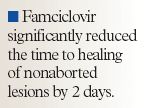- Safety & Recalls
- Regulatory Updates
- Drug Coverage
- COPD
- Cardiovascular
- Obstetrics-Gynecology & Women's Health
- Ophthalmology
- Clinical Pharmacology
- Pediatrics
- Urology
- Pharmacy
- Idiopathic Pulmonary Fibrosis
- Diabetes and Endocrinology
- Allergy, Immunology, and ENT
- Musculoskeletal/Rheumatology
- Respiratory
- Psychiatry and Behavioral Health
- Dermatology
- Oncology
Single-day famciclovir shortens duration of genital herpes outbreaks
A single day of famciclovir started within 6 hours of a genital herpes outbreak shortens the duration of recurrent genital herpes lesions, said Fred Y. Aoki, MD, at the 45th ICAAC meeting in Washington, DC.
A single day of famciclovir started within 6 hours of a genital herpes outbreak shortens the duration of recurrent genital herpes lesions, said Fred Y. Aoki, MD, at the 45th ICAAC meeting in Washington, DC.

The study was "another step in the evolution of treatment for episodic genital herpes, as researchers investigate shorter and shorter treatment times," he said. Before this study, success was demonstrated with a 3-day regimen of valacyclovir (500 mg bid) and a 2-day regimen of acyclovir (800 mg tid).
In the double-blind study, 329 patients with recurrent genital herpes were randomized to either famciclovir, 1 g twice orally or placebo for a single day. To be eligible, patients had to have 4 or more episodes in the preceding 12 months. More than 20% of patients in each group had been on suppressive therapy during the previous 12 months.
The proportion of patients with aborted lesions on an intent-to-treat analysis was 12.7% in the placebo group and 23.3% in the famciclovir group (P=.003). Among patients with lesions that were positive by polymerase chain reaction, the proportion with aborted lesions was 5.3% in the placebo group and 20.9% in the famciclovir group (P<.001).
Famciclovir significantly reduced the time to healing of nonaborted lesions by 2 days (median time: 4.3 d vs 6.1 d; P<.001).
The time to resolution of all studied symptoms (itching, pain, tingling, tenderness) was reduced by 39% (median time: 3.3 d vs 5.4 d; P<.001) in the famciclovir recipients relative to the placebo recipients.
Drug-related adverse events occurred in 13% of patients randomized to famciclovir and 9% of patients randomized to placebo. The reported adverse events were infrequent and mostly of mild-to-moderate severity.
Headache was the most-frequent adverse event in the famciclovir group (14%). Headaches were mostly of mild-to-moderate severity, occurred 1 or 2 days after the first dose of study medication, and lasted 1 to 3 days. Most patients with headaches took concomitant medication to resolve them. Prior to the study medication, headache occurred in 3.7% of famciclovir patients and 0.6% of placebo patients.
Having patients initiate therapy is practical since most are aware when recurrences are starting, Dr Aoki said. "The median time to starting therapy was 2 hours within symptom onset, which was better than anticipated," he said.
Coalition promotes important acetaminophen dosing reminders
November 18th 2014It may come as a surprise that each year Americans catch approximately 1 billion colds, and the Centers for Disease Control and Prevention estimates that as many as 20% get the flu. This cold and flu season, 7 in 10 patients will reach for an over-the-counter (OTC) medicine to treat their coughs, stuffy noses, and sniffles. It’s an important time of the year to remind patients to double check their medicine labels so they don’t double up on medicines containing acetaminophen.
Support consumer access to specialty medications through value-based insurance design
June 30th 2014The driving force behind consumer cost-sharing provisions for specialty medications is the acquisition cost and not clinical value. This appears to be true for almost all public and private health plans, says a new report from researchers at the University of Michigan Center for Value-Based Insurance Design (V-BID Center) and the National Pharmaceutical Council (NPC).
Management of antipsychotic medication polypharmacy
June 13th 2013Within our healthcare-driven society, the increase in the identification and diagnosis of mental illnesses has led to a proportional increase in the prescribing of psychotropic medications. The prevalence of mental illnesses and subsequent treatment approaches may employ monotherapy as first-line treatment, but in many cases the use of combination of therapy can occur, leading to polypharmacy.1 Polypharmacy can be defined in several ways but it generally recognized as the use of multiple medications by one patient and the most common definition is the concurrent use of five more medications. The presence of polyharmacy has the potential to contribute to non-compliance, drug-drug interactions, medication errors, adverse events, or poor quality of life.
Medical innovation improves outcomes
June 12th 2013I have been diagnosed with stage 4 cancer of the pancreas, a disease that’s long been considered not just incurable, but almost impossible to treat-a recalcitrant disease that some practitioners feel has given oncology a bad name. I was told my life would be measured in weeks.
